The Impact of Personal Values and Ethics on Counseling Sessions
VerifiedAdded on 2022/12/29
|26
|6599
|32
Report
AI Summary
This report examines the critical role of values and ethics in counseling, emphasizing the importance of counselors maintaining professional boundaries and avoiding the imposition of personal beliefs on clients. The assignment explores how counselors must be unbiased and client-focused, particularly when dealing with sensitive topics. It highlights the significance of self-reflection and seeking supervision to ensure ethical practice. The report includes a response to feedback, detailing changes to improve counseling services, such as increasing supervisor availability and implementing client feedback mechanisms. It emphasizes the importance of feedback for organizational improvement and outlines strategies for evaluating and enhancing counseling practices. The conclusion stresses the need for counselors to prioritize client well-being and maintain a neutral stance while providing support.
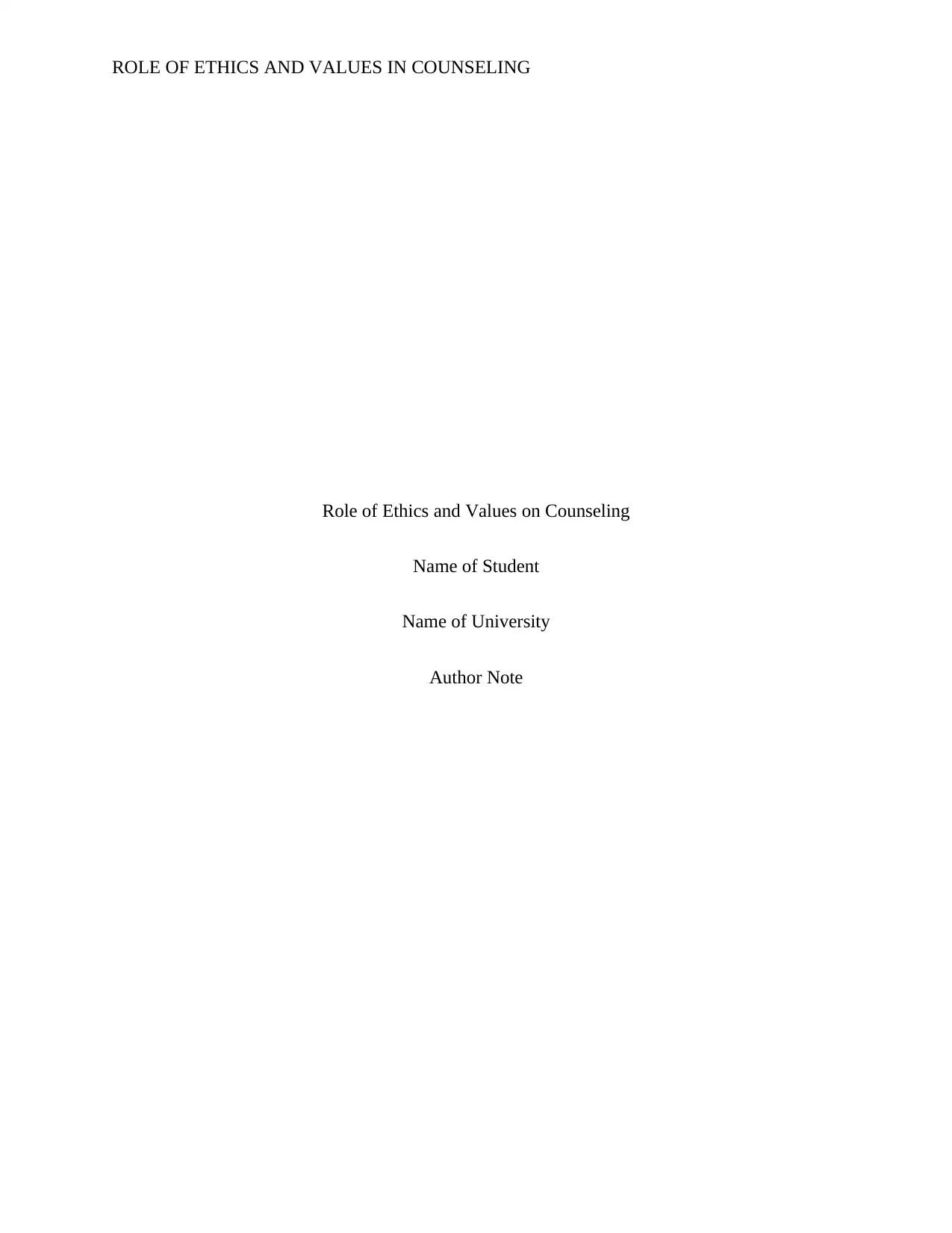
ROLE OF ETHICS AND VALUES IN COUNSELING
Role of Ethics and Values on Counseling
Name of Student
Name of University
Author Note
Role of Ethics and Values on Counseling
Name of Student
Name of University
Author Note
Paraphrase This Document
Need a fresh take? Get an instant paraphrase of this document with our AI Paraphraser
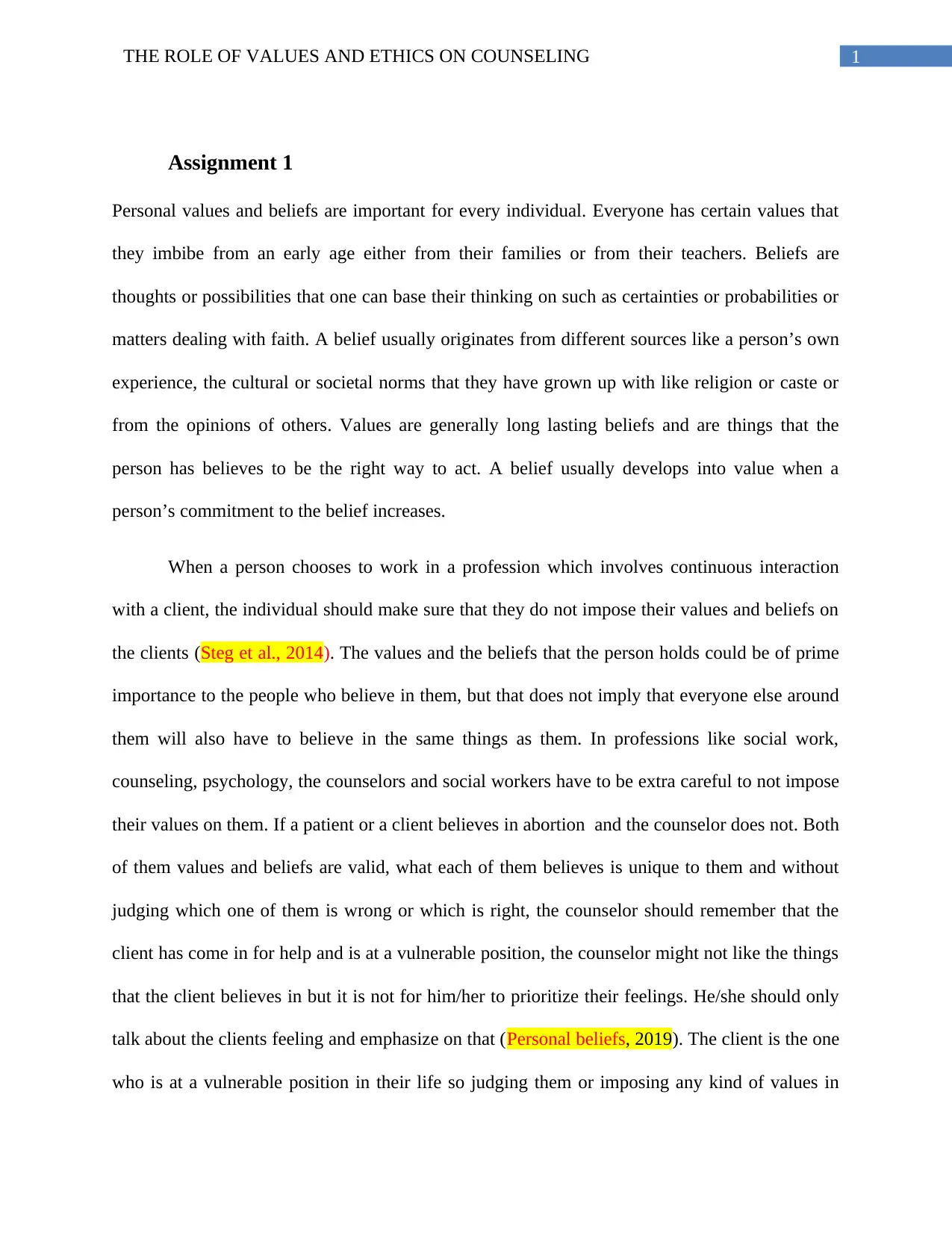
1THE ROLE OF VALUES AND ETHICS ON COUNSELING
Assignment 1
Personal values and beliefs are important for every individual. Everyone has certain values that
they imbibe from an early age either from their families or from their teachers. Beliefs are
thoughts or possibilities that one can base their thinking on such as certainties or probabilities or
matters dealing with faith. A belief usually originates from different sources like a person’s own
experience, the cultural or societal norms that they have grown up with like religion or caste or
from the opinions of others. Values are generally long lasting beliefs and are things that the
person has believes to be the right way to act. A belief usually develops into value when a
person’s commitment to the belief increases.
When a person chooses to work in a profession which involves continuous interaction
with a client, the individual should make sure that they do not impose their values and beliefs on
the clients (Steg et al., 2014). The values and the beliefs that the person holds could be of prime
importance to the people who believe in them, but that does not imply that everyone else around
them will also have to believe in the same things as them. In professions like social work,
counseling, psychology, the counselors and social workers have to be extra careful to not impose
their values on them. If a patient or a client believes in abortion and the counselor does not. Both
of them values and beliefs are valid, what each of them believes is unique to them and without
judging which one of them is wrong or which is right, the counselor should remember that the
client has come in for help and is at a vulnerable position, the counselor might not like the things
that the client believes in but it is not for him/her to prioritize their feelings. He/she should only
talk about the clients feeling and emphasize on that (Personal beliefs, 2019). The client is the one
who is at a vulnerable position in their life so judging them or imposing any kind of values in
Assignment 1
Personal values and beliefs are important for every individual. Everyone has certain values that
they imbibe from an early age either from their families or from their teachers. Beliefs are
thoughts or possibilities that one can base their thinking on such as certainties or probabilities or
matters dealing with faith. A belief usually originates from different sources like a person’s own
experience, the cultural or societal norms that they have grown up with like religion or caste or
from the opinions of others. Values are generally long lasting beliefs and are things that the
person has believes to be the right way to act. A belief usually develops into value when a
person’s commitment to the belief increases.
When a person chooses to work in a profession which involves continuous interaction
with a client, the individual should make sure that they do not impose their values and beliefs on
the clients (Steg et al., 2014). The values and the beliefs that the person holds could be of prime
importance to the people who believe in them, but that does not imply that everyone else around
them will also have to believe in the same things as them. In professions like social work,
counseling, psychology, the counselors and social workers have to be extra careful to not impose
their values on them. If a patient or a client believes in abortion and the counselor does not. Both
of them values and beliefs are valid, what each of them believes is unique to them and without
judging which one of them is wrong or which is right, the counselor should remember that the
client has come in for help and is at a vulnerable position, the counselor might not like the things
that the client believes in but it is not for him/her to prioritize their feelings. He/she should only
talk about the clients feeling and emphasize on that (Personal beliefs, 2019). The client is the one
who is at a vulnerable position in their life so judging them or imposing any kind of values in
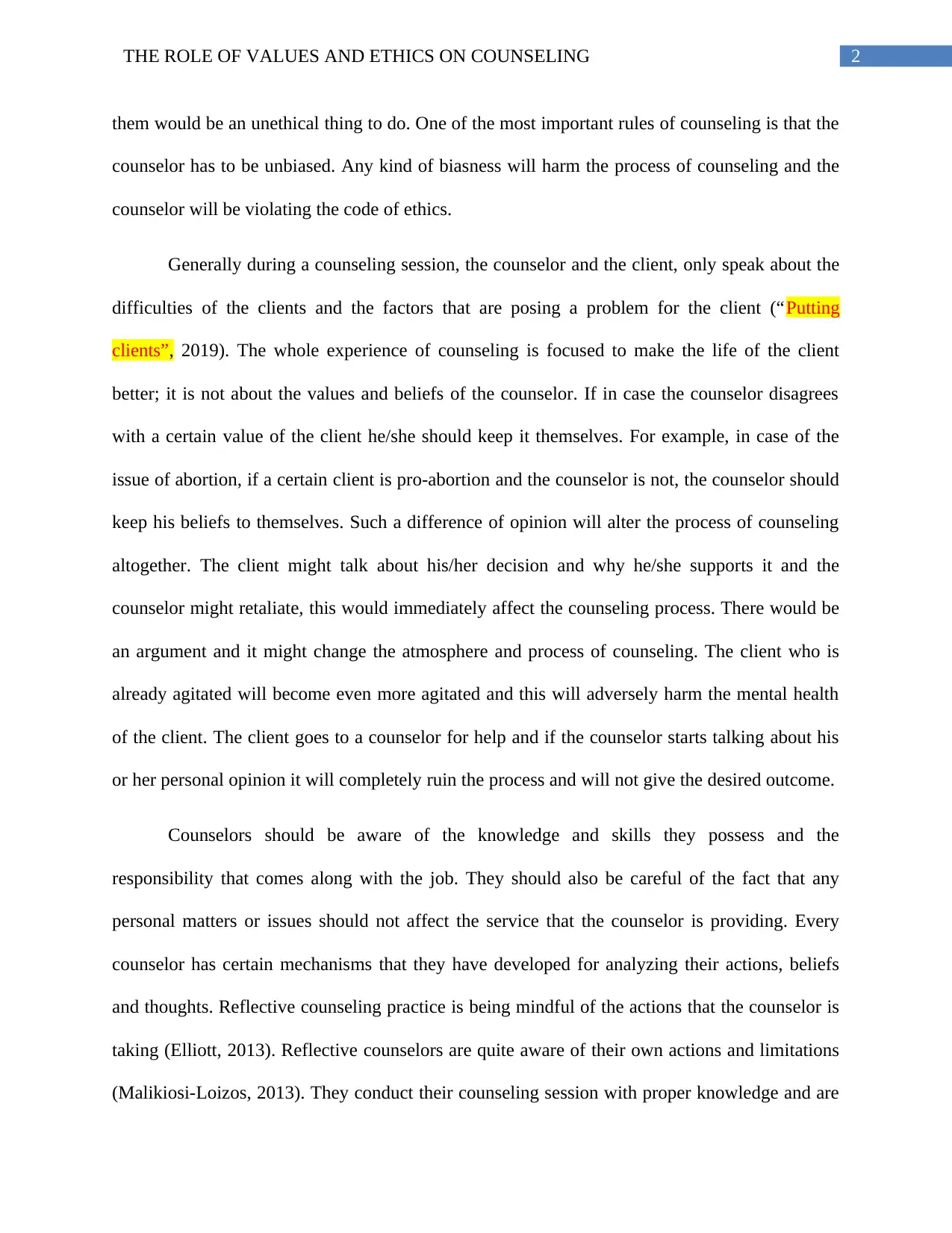
2THE ROLE OF VALUES AND ETHICS ON COUNSELING
them would be an unethical thing to do. One of the most important rules of counseling is that the
counselor has to be unbiased. Any kind of biasness will harm the process of counseling and the
counselor will be violating the code of ethics.
Generally during a counseling session, the counselor and the client, only speak about the
difficulties of the clients and the factors that are posing a problem for the client (“Putting
clients”, 2019). The whole experience of counseling is focused to make the life of the client
better; it is not about the values and beliefs of the counselor. If in case the counselor disagrees
with a certain value of the client he/she should keep it themselves. For example, in case of the
issue of abortion, if a certain client is pro-abortion and the counselor is not, the counselor should
keep his beliefs to themselves. Such a difference of opinion will alter the process of counseling
altogether. The client might talk about his/her decision and why he/she supports it and the
counselor might retaliate, this would immediately affect the counseling process. There would be
an argument and it might change the atmosphere and process of counseling. The client who is
already agitated will become even more agitated and this will adversely harm the mental health
of the client. The client goes to a counselor for help and if the counselor starts talking about his
or her personal opinion it will completely ruin the process and will not give the desired outcome.
Counselors should be aware of the knowledge and skills they possess and the
responsibility that comes along with the job. They should also be careful of the fact that any
personal matters or issues should not affect the service that the counselor is providing. Every
counselor has certain mechanisms that they have developed for analyzing their actions, beliefs
and thoughts. Reflective counseling practice is being mindful of the actions that the counselor is
taking (Elliott, 2013). Reflective counselors are quite aware of their own actions and limitations
(Malikiosi-Loizos, 2013). They conduct their counseling session with proper knowledge and are
them would be an unethical thing to do. One of the most important rules of counseling is that the
counselor has to be unbiased. Any kind of biasness will harm the process of counseling and the
counselor will be violating the code of ethics.
Generally during a counseling session, the counselor and the client, only speak about the
difficulties of the clients and the factors that are posing a problem for the client (“Putting
clients”, 2019). The whole experience of counseling is focused to make the life of the client
better; it is not about the values and beliefs of the counselor. If in case the counselor disagrees
with a certain value of the client he/she should keep it themselves. For example, in case of the
issue of abortion, if a certain client is pro-abortion and the counselor is not, the counselor should
keep his beliefs to themselves. Such a difference of opinion will alter the process of counseling
altogether. The client might talk about his/her decision and why he/she supports it and the
counselor might retaliate, this would immediately affect the counseling process. There would be
an argument and it might change the atmosphere and process of counseling. The client who is
already agitated will become even more agitated and this will adversely harm the mental health
of the client. The client goes to a counselor for help and if the counselor starts talking about his
or her personal opinion it will completely ruin the process and will not give the desired outcome.
Counselors should be aware of the knowledge and skills they possess and the
responsibility that comes along with the job. They should also be careful of the fact that any
personal matters or issues should not affect the service that the counselor is providing. Every
counselor has certain mechanisms that they have developed for analyzing their actions, beliefs
and thoughts. Reflective counseling practice is being mindful of the actions that the counselor is
taking (Elliott, 2013). Reflective counselors are quite aware of their own actions and limitations
(Malikiosi-Loizos, 2013). They conduct their counseling session with proper knowledge and are
⊘ This is a preview!⊘
Do you want full access?
Subscribe today to unlock all pages.

Trusted by 1+ million students worldwide
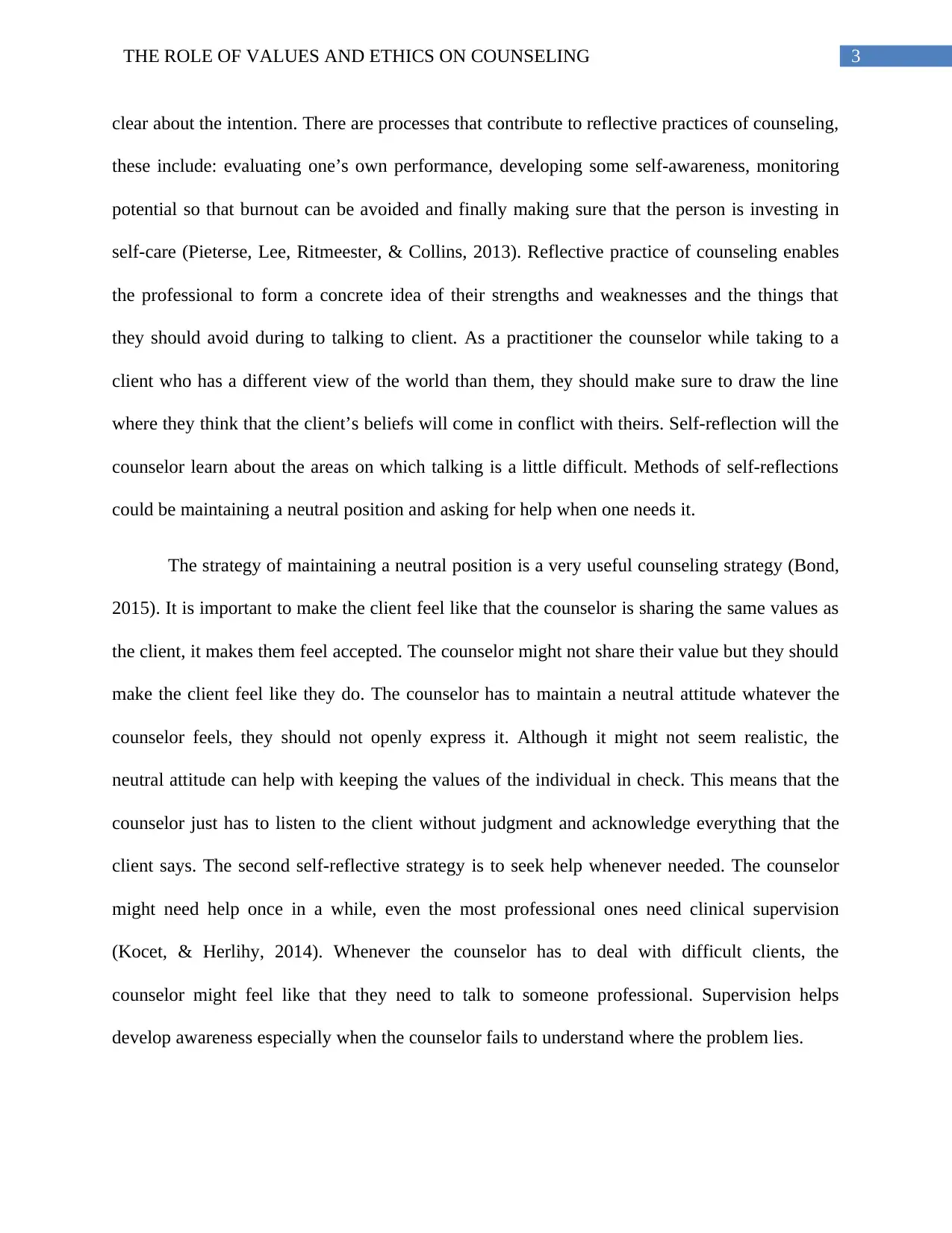
3THE ROLE OF VALUES AND ETHICS ON COUNSELING
clear about the intention. There are processes that contribute to reflective practices of counseling,
these include: evaluating one’s own performance, developing some self-awareness, monitoring
potential so that burnout can be avoided and finally making sure that the person is investing in
self-care (Pieterse, Lee, Ritmeester, & Collins, 2013). Reflective practice of counseling enables
the professional to form a concrete idea of their strengths and weaknesses and the things that
they should avoid during to talking to client. As a practitioner the counselor while taking to a
client who has a different view of the world than them, they should make sure to draw the line
where they think that the client’s beliefs will come in conflict with theirs. Self-reflection will the
counselor learn about the areas on which talking is a little difficult. Methods of self-reflections
could be maintaining a neutral position and asking for help when one needs it.
The strategy of maintaining a neutral position is a very useful counseling strategy (Bond,
2015). It is important to make the client feel like that the counselor is sharing the same values as
the client, it makes them feel accepted. The counselor might not share their value but they should
make the client feel like they do. The counselor has to maintain a neutral attitude whatever the
counselor feels, they should not openly express it. Although it might not seem realistic, the
neutral attitude can help with keeping the values of the individual in check. This means that the
counselor just has to listen to the client without judgment and acknowledge everything that the
client says. The second self-reflective strategy is to seek help whenever needed. The counselor
might need help once in a while, even the most professional ones need clinical supervision
(Kocet, & Herlihy, 2014). Whenever the counselor has to deal with difficult clients, the
counselor might feel like that they need to talk to someone professional. Supervision helps
develop awareness especially when the counselor fails to understand where the problem lies.
clear about the intention. There are processes that contribute to reflective practices of counseling,
these include: evaluating one’s own performance, developing some self-awareness, monitoring
potential so that burnout can be avoided and finally making sure that the person is investing in
self-care (Pieterse, Lee, Ritmeester, & Collins, 2013). Reflective practice of counseling enables
the professional to form a concrete idea of their strengths and weaknesses and the things that
they should avoid during to talking to client. As a practitioner the counselor while taking to a
client who has a different view of the world than them, they should make sure to draw the line
where they think that the client’s beliefs will come in conflict with theirs. Self-reflection will the
counselor learn about the areas on which talking is a little difficult. Methods of self-reflections
could be maintaining a neutral position and asking for help when one needs it.
The strategy of maintaining a neutral position is a very useful counseling strategy (Bond,
2015). It is important to make the client feel like that the counselor is sharing the same values as
the client, it makes them feel accepted. The counselor might not share their value but they should
make the client feel like they do. The counselor has to maintain a neutral attitude whatever the
counselor feels, they should not openly express it. Although it might not seem realistic, the
neutral attitude can help with keeping the values of the individual in check. This means that the
counselor just has to listen to the client without judgment and acknowledge everything that the
client says. The second self-reflective strategy is to seek help whenever needed. The counselor
might need help once in a while, even the most professional ones need clinical supervision
(Kocet, & Herlihy, 2014). Whenever the counselor has to deal with difficult clients, the
counselor might feel like that they need to talk to someone professional. Supervision helps
develop awareness especially when the counselor fails to understand where the problem lies.
Paraphrase This Document
Need a fresh take? Get an instant paraphrase of this document with our AI Paraphraser
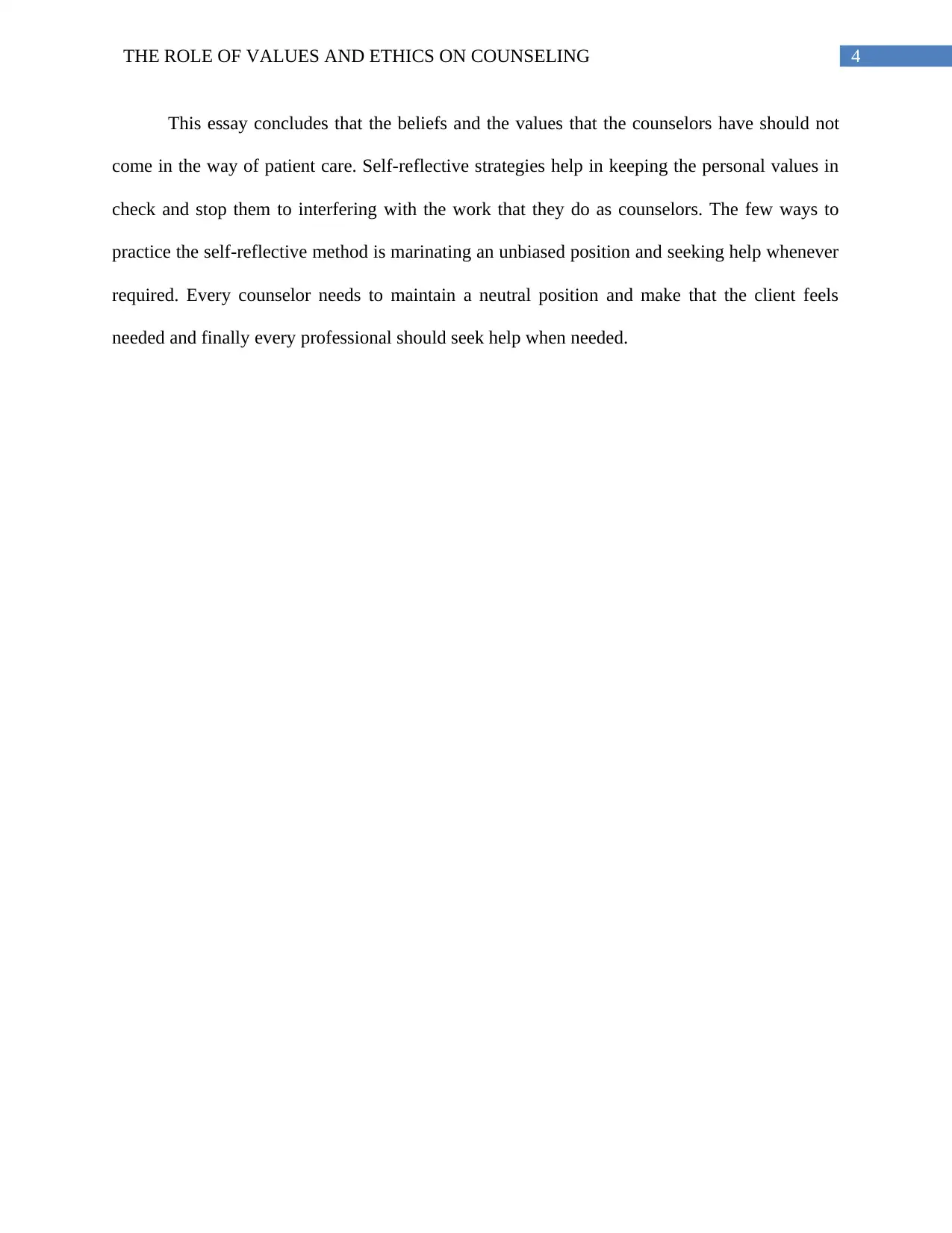
4THE ROLE OF VALUES AND ETHICS ON COUNSELING
This essay concludes that the beliefs and the values that the counselors have should not
come in the way of patient care. Self-reflective strategies help in keeping the personal values in
check and stop them to interfering with the work that they do as counselors. The few ways to
practice the self-reflective method is marinating an unbiased position and seeking help whenever
required. Every counselor needs to maintain a neutral position and make that the client feels
needed and finally every professional should seek help when needed.
This essay concludes that the beliefs and the values that the counselors have should not
come in the way of patient care. Self-reflective strategies help in keeping the personal values in
check and stop them to interfering with the work that they do as counselors. The few ways to
practice the self-reflective method is marinating an unbiased position and seeking help whenever
required. Every counselor needs to maintain a neutral position and make that the client feels
needed and finally every professional should seek help when needed.
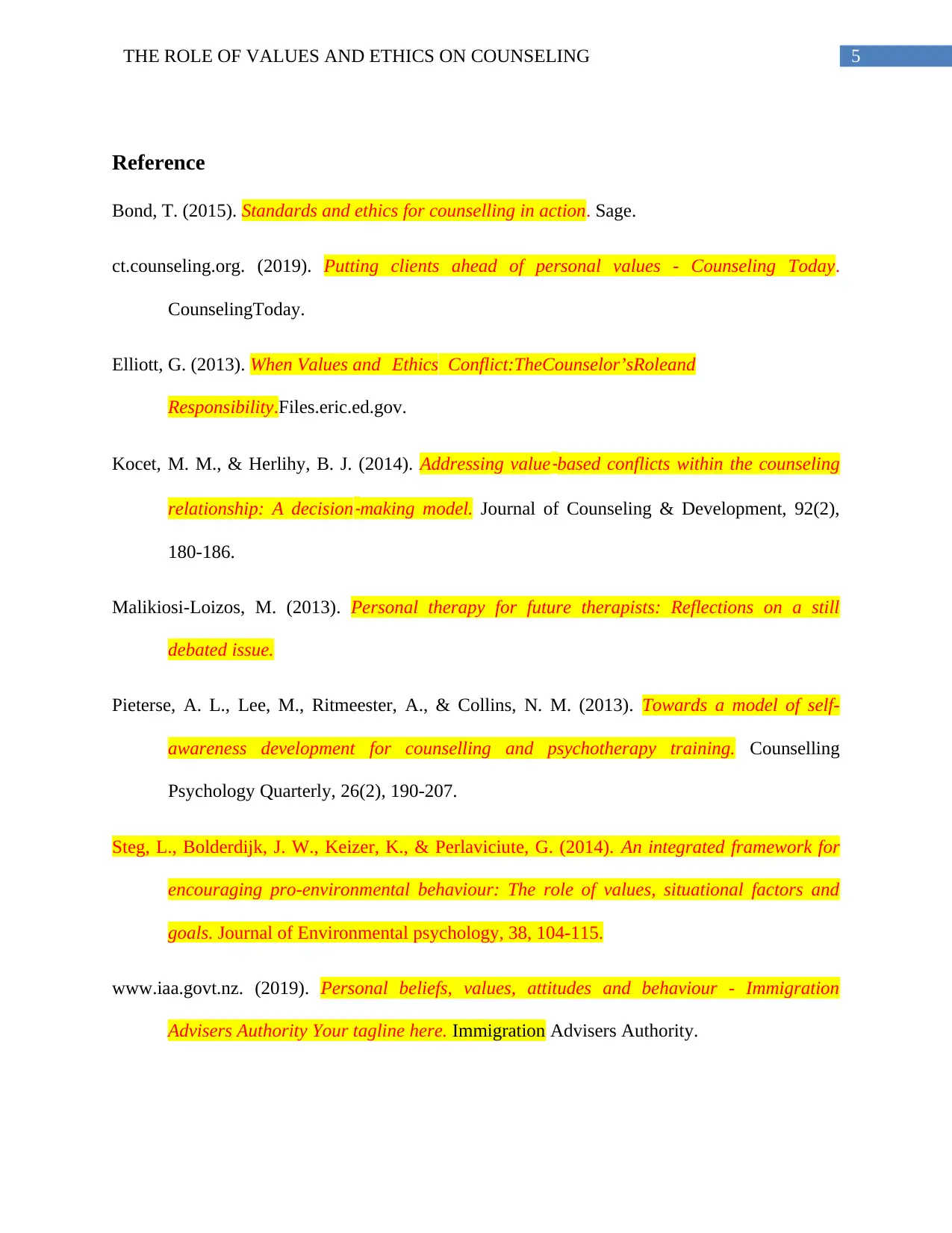
5THE ROLE OF VALUES AND ETHICS ON COUNSELING
Reference
Bond, T. (2015). Standards and ethics for counselling in action. Sage.
ct.counseling.org. (2019). Putting clients ahead of personal values - Counseling Today.
CounselingToday.
Elliott, G. (2013). When Values and Ethics Conflict:TheCounselor’sRoleand
Responsibility.Files.eric.ed.gov.
Kocet, M. M., & Herlihy, B. J. (2014). Addressing value
‐based conflicts within the counseling
relationship: A decision
‐making model. Journal of Counseling & Development, 92(2),
180-186.
Malikiosi-Loizos, M. (2013). Personal therapy for future therapists: Reflections on a still
debated issue.
Pieterse, A. L., Lee, M., Ritmeester, A., & Collins, N. M. (2013). Towards a model of self-
awareness development for counselling and psychotherapy training. Counselling
Psychology Quarterly, 26(2), 190-207.
Steg, L., Bolderdijk, J. W., Keizer, K., & Perlaviciute, G. (2014). An integrated framework for
encouraging pro-environmental behaviour: The role of values, situational factors and
goals. Journal of Environmental psychology, 38, 104-115.
www.iaa.govt.nz. (2019). Personal beliefs, values, attitudes and behaviour - Immigration
Advisers Authority Your tagline here. Immigration Advisers Authority.
Reference
Bond, T. (2015). Standards and ethics for counselling in action. Sage.
ct.counseling.org. (2019). Putting clients ahead of personal values - Counseling Today.
CounselingToday.
Elliott, G. (2013). When Values and Ethics Conflict:TheCounselor’sRoleand
Responsibility.Files.eric.ed.gov.
Kocet, M. M., & Herlihy, B. J. (2014). Addressing value
‐based conflicts within the counseling
relationship: A decision
‐making model. Journal of Counseling & Development, 92(2),
180-186.
Malikiosi-Loizos, M. (2013). Personal therapy for future therapists: Reflections on a still
debated issue.
Pieterse, A. L., Lee, M., Ritmeester, A., & Collins, N. M. (2013). Towards a model of self-
awareness development for counselling and psychotherapy training. Counselling
Psychology Quarterly, 26(2), 190-207.
Steg, L., Bolderdijk, J. W., Keizer, K., & Perlaviciute, G. (2014). An integrated framework for
encouraging pro-environmental behaviour: The role of values, situational factors and
goals. Journal of Environmental psychology, 38, 104-115.
www.iaa.govt.nz. (2019). Personal beliefs, values, attitudes and behaviour - Immigration
Advisers Authority Your tagline here. Immigration Advisers Authority.
⊘ This is a preview!⊘
Do you want full access?
Subscribe today to unlock all pages.

Trusted by 1+ million students worldwide
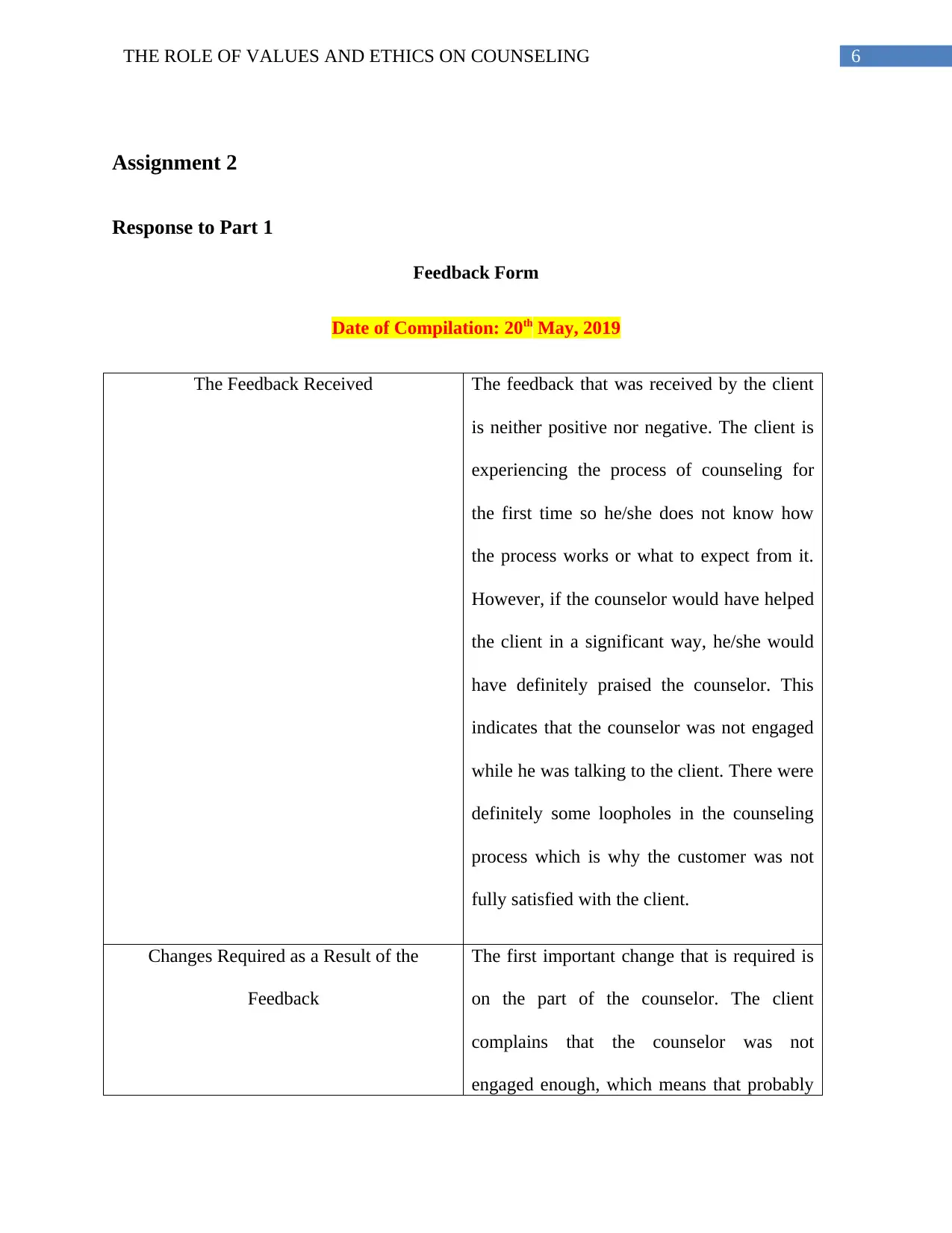
6THE ROLE OF VALUES AND ETHICS ON COUNSELING
Assignment 2
Response to Part 1
Feedback Form
Date of Compilation: 20th May, 2019
The Feedback Received The feedback that was received by the client
is neither positive nor negative. The client is
experiencing the process of counseling for
the first time so he/she does not know how
the process works or what to expect from it.
However, if the counselor would have helped
the client in a significant way, he/she would
have definitely praised the counselor. This
indicates that the counselor was not engaged
while he was talking to the client. There were
definitely some loopholes in the counseling
process which is why the customer was not
fully satisfied with the client.
Changes Required as a Result of the
Feedback
The first important change that is required is
on the part of the counselor. The client
complains that the counselor was not
engaged enough, which means that probably
Assignment 2
Response to Part 1
Feedback Form
Date of Compilation: 20th May, 2019
The Feedback Received The feedback that was received by the client
is neither positive nor negative. The client is
experiencing the process of counseling for
the first time so he/she does not know how
the process works or what to expect from it.
However, if the counselor would have helped
the client in a significant way, he/she would
have definitely praised the counselor. This
indicates that the counselor was not engaged
while he was talking to the client. There were
definitely some loopholes in the counseling
process which is why the customer was not
fully satisfied with the client.
Changes Required as a Result of the
Feedback
The first important change that is required is
on the part of the counselor. The client
complains that the counselor was not
engaged enough, which means that probably
Paraphrase This Document
Need a fresh take? Get an instant paraphrase of this document with our AI Paraphraser
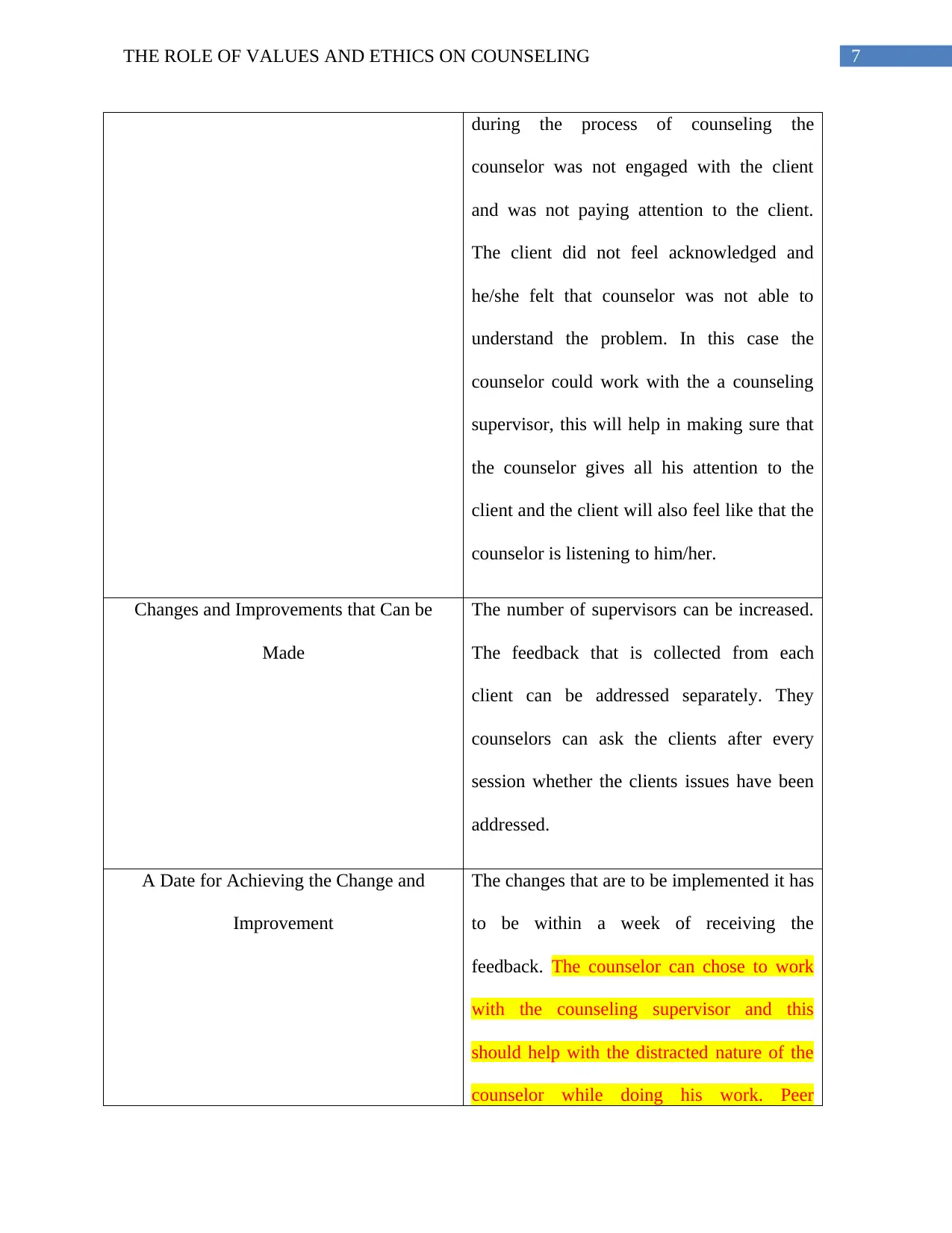
7THE ROLE OF VALUES AND ETHICS ON COUNSELING
during the process of counseling the
counselor was not engaged with the client
and was not paying attention to the client.
The client did not feel acknowledged and
he/she felt that counselor was not able to
understand the problem. In this case the
counselor could work with the a counseling
supervisor, this will help in making sure that
the counselor gives all his attention to the
client and the client will also feel like that the
counselor is listening to him/her.
Changes and Improvements that Can be
Made
The number of supervisors can be increased.
The feedback that is collected from each
client can be addressed separately. They
counselors can ask the clients after every
session whether the clients issues have been
addressed.
A Date for Achieving the Change and
Improvement
The changes that are to be implemented it has
to be within a week of receiving the
feedback. The counselor can chose to work
with the counseling supervisor and this
should help with the distracted nature of the
counselor while doing his work. Peer
during the process of counseling the
counselor was not engaged with the client
and was not paying attention to the client.
The client did not feel acknowledged and
he/she felt that counselor was not able to
understand the problem. In this case the
counselor could work with the a counseling
supervisor, this will help in making sure that
the counselor gives all his attention to the
client and the client will also feel like that the
counselor is listening to him/her.
Changes and Improvements that Can be
Made
The number of supervisors can be increased.
The feedback that is collected from each
client can be addressed separately. They
counselors can ask the clients after every
session whether the clients issues have been
addressed.
A Date for Achieving the Change and
Improvement
The changes that are to be implemented it has
to be within a week of receiving the
feedback. The counselor can chose to work
with the counseling supervisor and this
should help with the distracted nature of the
counselor while doing his work. Peer
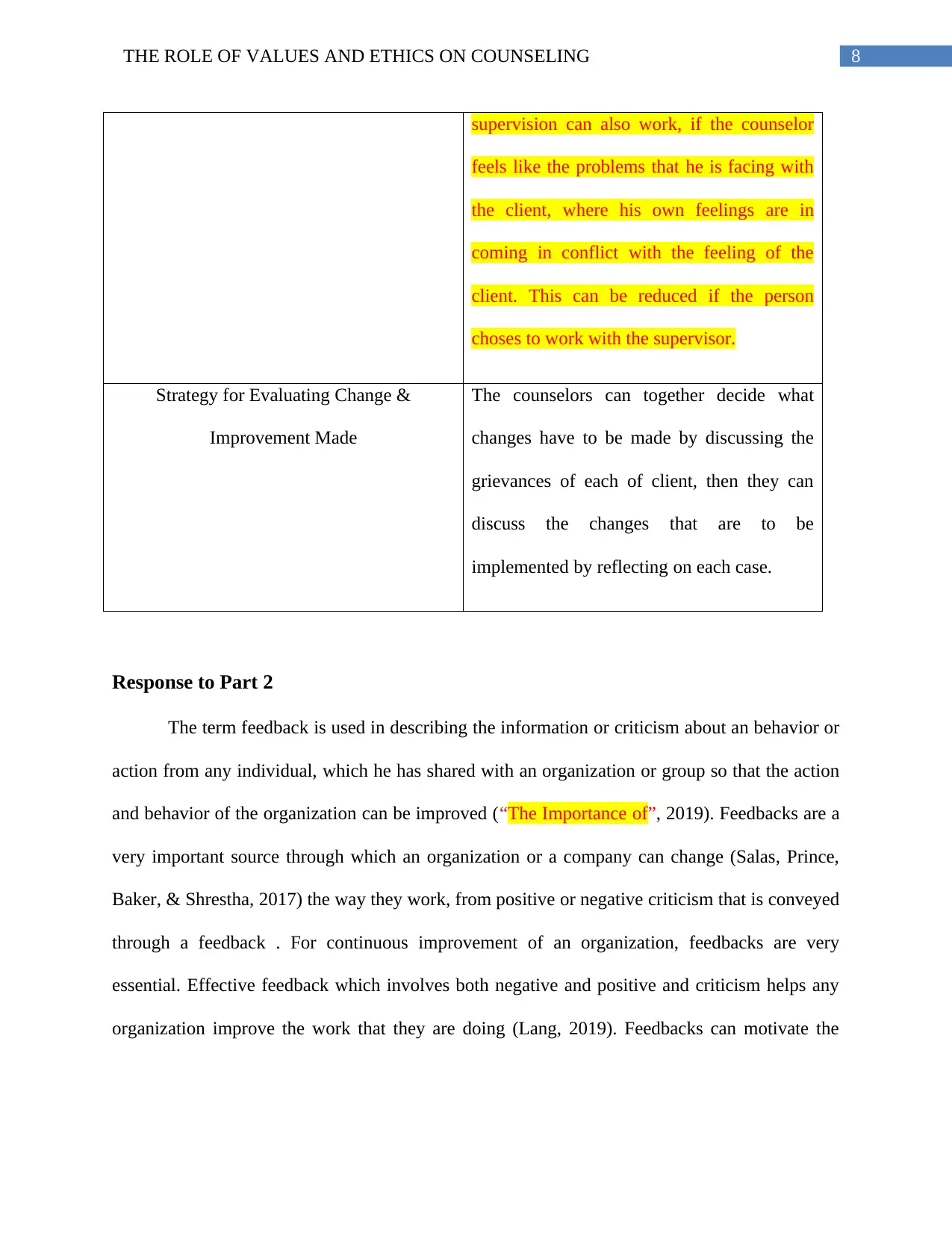
8THE ROLE OF VALUES AND ETHICS ON COUNSELING
supervision can also work, if the counselor
feels like the problems that he is facing with
the client, where his own feelings are in
coming in conflict with the feeling of the
client. This can be reduced if the person
choses to work with the supervisor.
Strategy for Evaluating Change &
Improvement Made
The counselors can together decide what
changes have to be made by discussing the
grievances of each of client, then they can
discuss the changes that are to be
implemented by reflecting on each case.
Response to Part 2
The term feedback is used in describing the information or criticism about an behavior or
action from any individual, which he has shared with an organization or group so that the action
and behavior of the organization can be improved (“The Importance of”, 2019). Feedbacks are a
very important source through which an organization or a company can change (Salas, Prince,
Baker, & Shrestha, 2017) the way they work, from positive or negative criticism that is conveyed
through a feedback . For continuous improvement of an organization, feedbacks are very
essential. Effective feedback which involves both negative and positive and criticism helps any
organization improve the work that they are doing (Lang, 2019). Feedbacks can motivate the
supervision can also work, if the counselor
feels like the problems that he is facing with
the client, where his own feelings are in
coming in conflict with the feeling of the
client. This can be reduced if the person
choses to work with the supervisor.
Strategy for Evaluating Change &
Improvement Made
The counselors can together decide what
changes have to be made by discussing the
grievances of each of client, then they can
discuss the changes that are to be
implemented by reflecting on each case.
Response to Part 2
The term feedback is used in describing the information or criticism about an behavior or
action from any individual, which he has shared with an organization or group so that the action
and behavior of the organization can be improved (“The Importance of”, 2019). Feedbacks are a
very important source through which an organization or a company can change (Salas, Prince,
Baker, & Shrestha, 2017) the way they work, from positive or negative criticism that is conveyed
through a feedback . For continuous improvement of an organization, feedbacks are very
essential. Effective feedback which involves both negative and positive and criticism helps any
organization improve the work that they are doing (Lang, 2019). Feedbacks can motivate the
⊘ This is a preview!⊘
Do you want full access?
Subscribe today to unlock all pages.

Trusted by 1+ million students worldwide
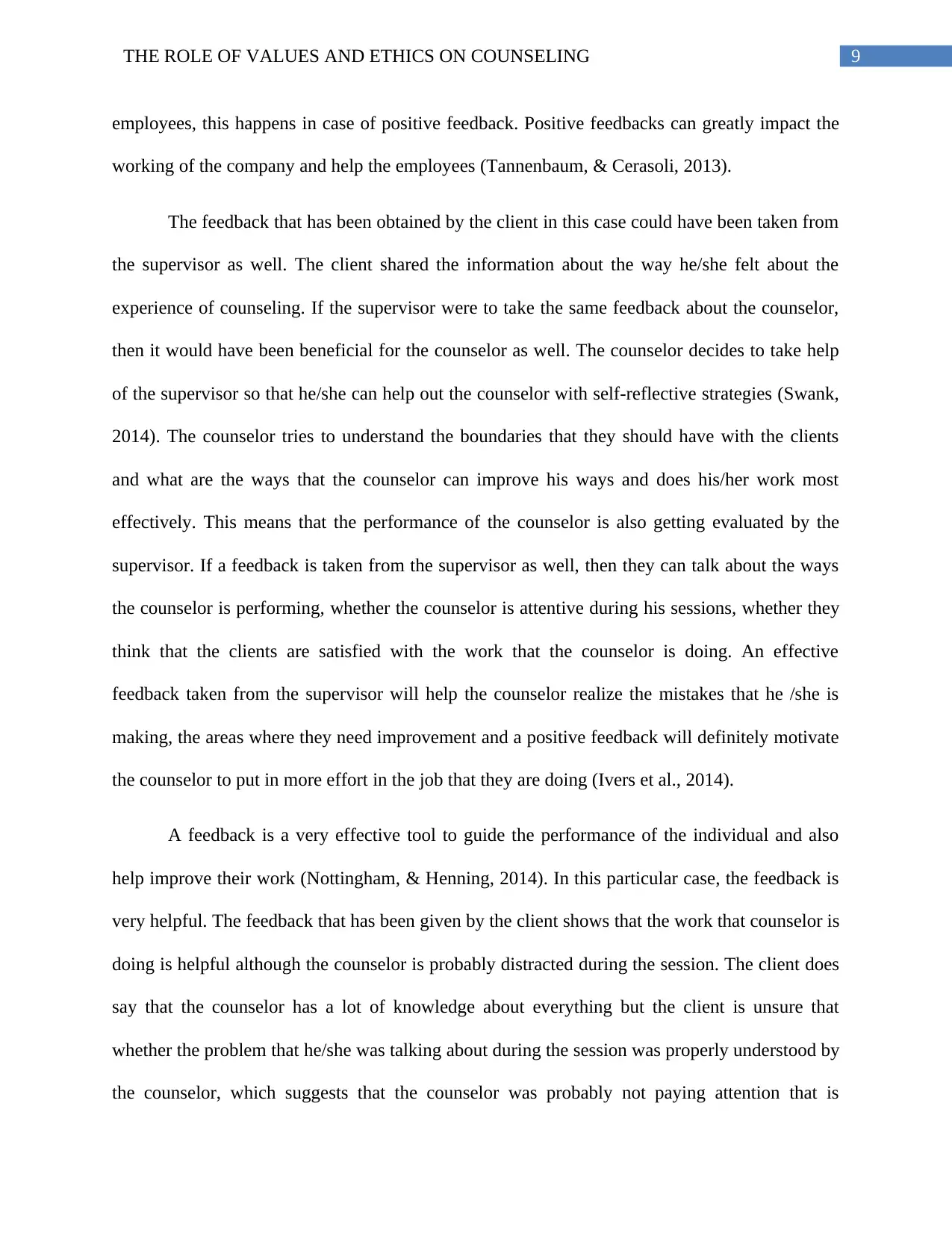
9THE ROLE OF VALUES AND ETHICS ON COUNSELING
employees, this happens in case of positive feedback. Positive feedbacks can greatly impact the
working of the company and help the employees (Tannenbaum, & Cerasoli, 2013).
The feedback that has been obtained by the client in this case could have been taken from
the supervisor as well. The client shared the information about the way he/she felt about the
experience of counseling. If the supervisor were to take the same feedback about the counselor,
then it would have been beneficial for the counselor as well. The counselor decides to take help
of the supervisor so that he/she can help out the counselor with self-reflective strategies (Swank,
2014). The counselor tries to understand the boundaries that they should have with the clients
and what are the ways that the counselor can improve his ways and does his/her work most
effectively. This means that the performance of the counselor is also getting evaluated by the
supervisor. If a feedback is taken from the supervisor as well, then they can talk about the ways
the counselor is performing, whether the counselor is attentive during his sessions, whether they
think that the clients are satisfied with the work that the counselor is doing. An effective
feedback taken from the supervisor will help the counselor realize the mistakes that he /she is
making, the areas where they need improvement and a positive feedback will definitely motivate
the counselor to put in more effort in the job that they are doing (Ivers et al., 2014).
A feedback is a very effective tool to guide the performance of the individual and also
help improve their work (Nottingham, & Henning, 2014). In this particular case, the feedback is
very helpful. The feedback that has been given by the client shows that the work that counselor is
doing is helpful although the counselor is probably distracted during the session. The client does
say that the counselor has a lot of knowledge about everything but the client is unsure that
whether the problem that he/she was talking about during the session was properly understood by
the counselor, which suggests that the counselor was probably not paying attention that is
employees, this happens in case of positive feedback. Positive feedbacks can greatly impact the
working of the company and help the employees (Tannenbaum, & Cerasoli, 2013).
The feedback that has been obtained by the client in this case could have been taken from
the supervisor as well. The client shared the information about the way he/she felt about the
experience of counseling. If the supervisor were to take the same feedback about the counselor,
then it would have been beneficial for the counselor as well. The counselor decides to take help
of the supervisor so that he/she can help out the counselor with self-reflective strategies (Swank,
2014). The counselor tries to understand the boundaries that they should have with the clients
and what are the ways that the counselor can improve his ways and does his/her work most
effectively. This means that the performance of the counselor is also getting evaluated by the
supervisor. If a feedback is taken from the supervisor as well, then they can talk about the ways
the counselor is performing, whether the counselor is attentive during his sessions, whether they
think that the clients are satisfied with the work that the counselor is doing. An effective
feedback taken from the supervisor will help the counselor realize the mistakes that he /she is
making, the areas where they need improvement and a positive feedback will definitely motivate
the counselor to put in more effort in the job that they are doing (Ivers et al., 2014).
A feedback is a very effective tool to guide the performance of the individual and also
help improve their work (Nottingham, & Henning, 2014). In this particular case, the feedback is
very helpful. The feedback that has been given by the client shows that the work that counselor is
doing is helpful although the counselor is probably distracted during the session. The client does
say that the counselor has a lot of knowledge about everything but the client is unsure that
whether the problem that he/she was talking about during the session was properly understood by
the counselor, which suggests that the counselor was probably not paying attention that is
Paraphrase This Document
Need a fresh take? Get an instant paraphrase of this document with our AI Paraphraser
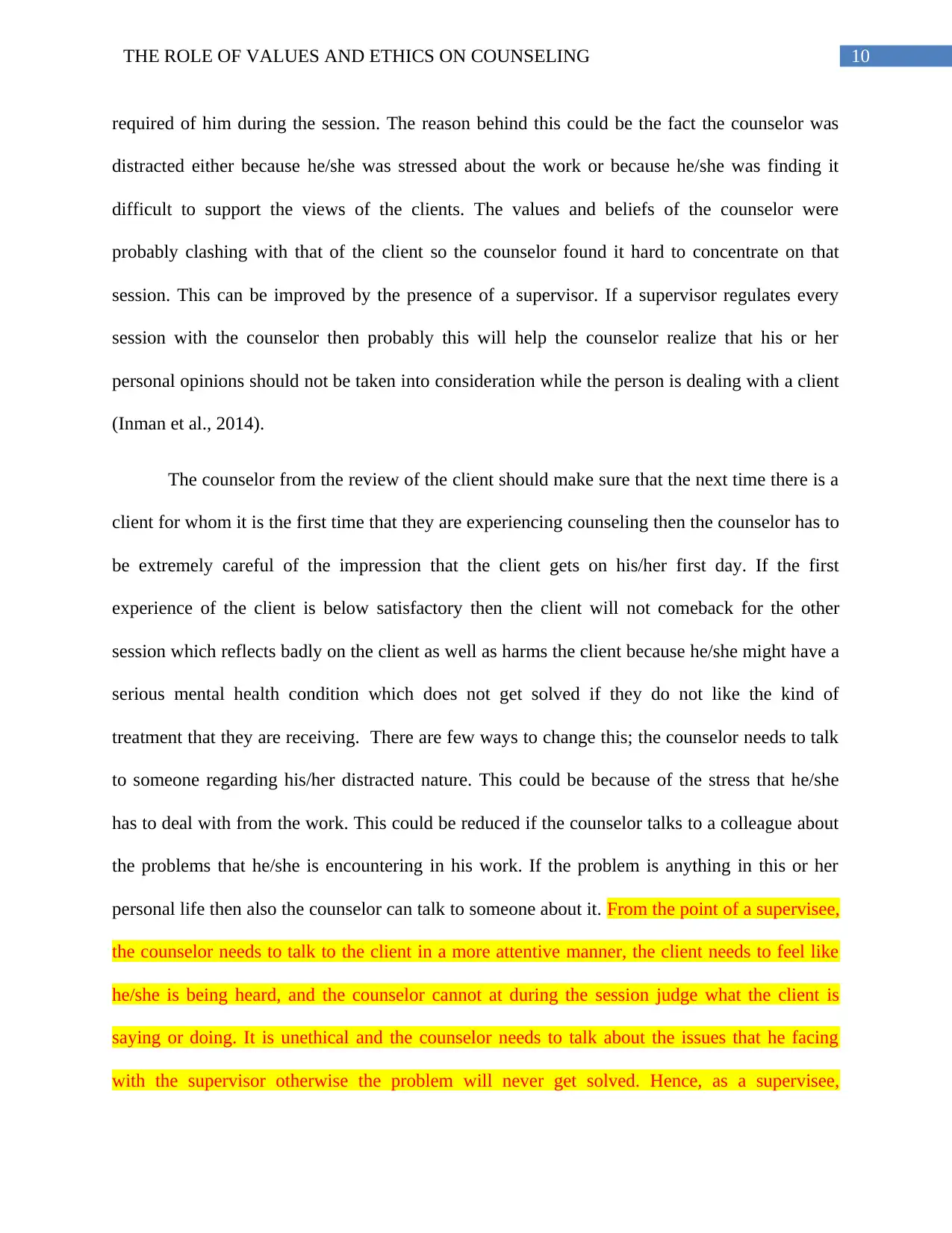
10THE ROLE OF VALUES AND ETHICS ON COUNSELING
required of him during the session. The reason behind this could be the fact the counselor was
distracted either because he/she was stressed about the work or because he/she was finding it
difficult to support the views of the clients. The values and beliefs of the counselor were
probably clashing with that of the client so the counselor found it hard to concentrate on that
session. This can be improved by the presence of a supervisor. If a supervisor regulates every
session with the counselor then probably this will help the counselor realize that his or her
personal opinions should not be taken into consideration while the person is dealing with a client
(Inman et al., 2014).
The counselor from the review of the client should make sure that the next time there is a
client for whom it is the first time that they are experiencing counseling then the counselor has to
be extremely careful of the impression that the client gets on his/her first day. If the first
experience of the client is below satisfactory then the client will not comeback for the other
session which reflects badly on the client as well as harms the client because he/she might have a
serious mental health condition which does not get solved if they do not like the kind of
treatment that they are receiving. There are few ways to change this; the counselor needs to talk
to someone regarding his/her distracted nature. This could be because of the stress that he/she
has to deal with from the work. This could be reduced if the counselor talks to a colleague about
the problems that he/she is encountering in his work. If the problem is anything in this or her
personal life then also the counselor can talk to someone about it. From the point of a supervisee,
the counselor needs to talk to the client in a more attentive manner, the client needs to feel like
he/she is being heard, and the counselor cannot at during the session judge what the client is
saying or doing. It is unethical and the counselor needs to talk about the issues that he facing
with the supervisor otherwise the problem will never get solved. Hence, as a supervisee,
required of him during the session. The reason behind this could be the fact the counselor was
distracted either because he/she was stressed about the work or because he/she was finding it
difficult to support the views of the clients. The values and beliefs of the counselor were
probably clashing with that of the client so the counselor found it hard to concentrate on that
session. This can be improved by the presence of a supervisor. If a supervisor regulates every
session with the counselor then probably this will help the counselor realize that his or her
personal opinions should not be taken into consideration while the person is dealing with a client
(Inman et al., 2014).
The counselor from the review of the client should make sure that the next time there is a
client for whom it is the first time that they are experiencing counseling then the counselor has to
be extremely careful of the impression that the client gets on his/her first day. If the first
experience of the client is below satisfactory then the client will not comeback for the other
session which reflects badly on the client as well as harms the client because he/she might have a
serious mental health condition which does not get solved if they do not like the kind of
treatment that they are receiving. There are few ways to change this; the counselor needs to talk
to someone regarding his/her distracted nature. This could be because of the stress that he/she
has to deal with from the work. This could be reduced if the counselor talks to a colleague about
the problems that he/she is encountering in his work. If the problem is anything in this or her
personal life then also the counselor can talk to someone about it. From the point of a supervisee,
the counselor needs to talk to the client in a more attentive manner, the client needs to feel like
he/she is being heard, and the counselor cannot at during the session judge what the client is
saying or doing. It is unethical and the counselor needs to talk about the issues that he facing
with the supervisor otherwise the problem will never get solved. Hence, as a supervisee,
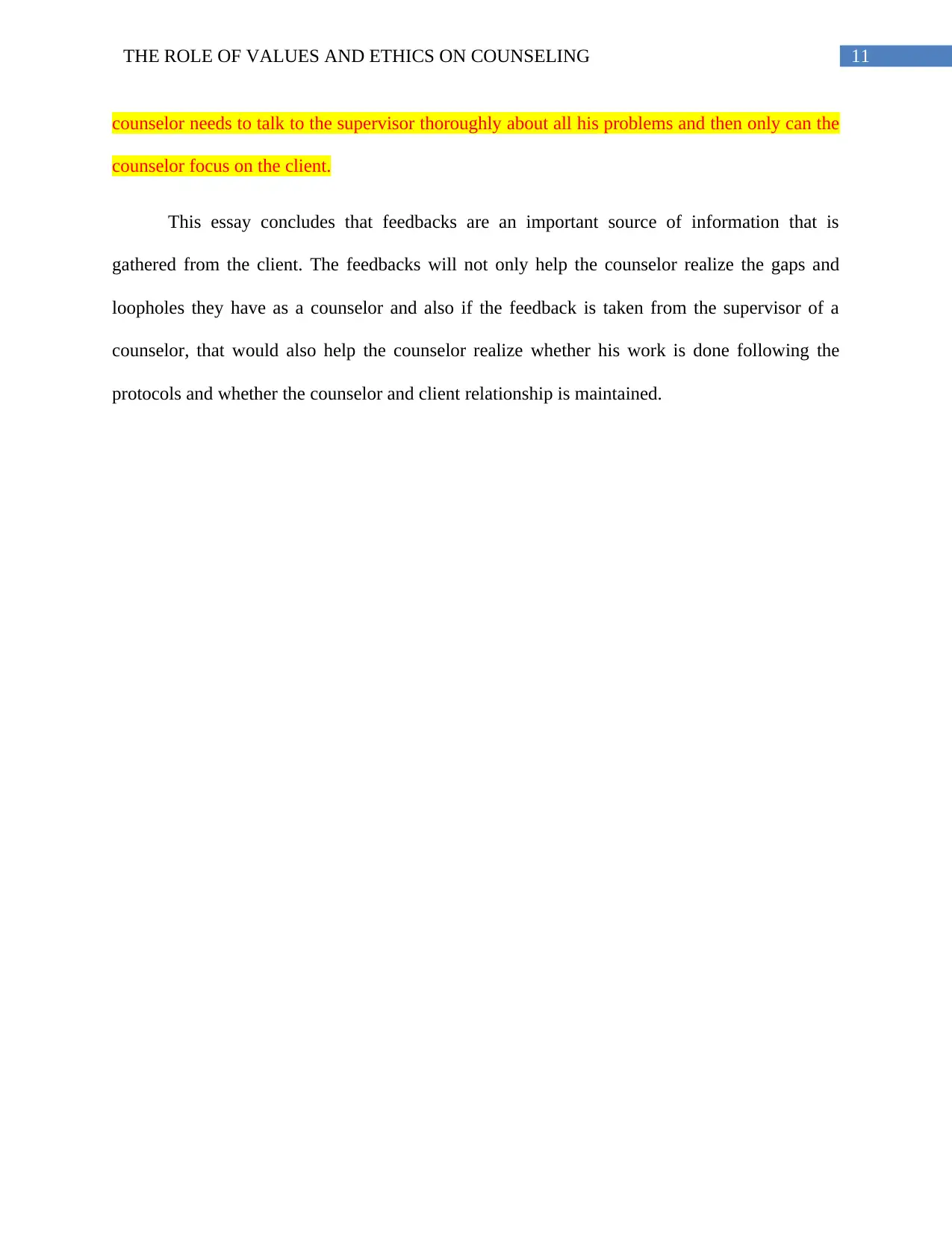
11THE ROLE OF VALUES AND ETHICS ON COUNSELING
counselor needs to talk to the supervisor thoroughly about all his problems and then only can the
counselor focus on the client.
This essay concludes that feedbacks are an important source of information that is
gathered from the client. The feedbacks will not only help the counselor realize the gaps and
loopholes they have as a counselor and also if the feedback is taken from the supervisor of a
counselor, that would also help the counselor realize whether his work is done following the
protocols and whether the counselor and client relationship is maintained.
counselor needs to talk to the supervisor thoroughly about all his problems and then only can the
counselor focus on the client.
This essay concludes that feedbacks are an important source of information that is
gathered from the client. The feedbacks will not only help the counselor realize the gaps and
loopholes they have as a counselor and also if the feedback is taken from the supervisor of a
counselor, that would also help the counselor realize whether his work is done following the
protocols and whether the counselor and client relationship is maintained.
⊘ This is a preview!⊘
Do you want full access?
Subscribe today to unlock all pages.

Trusted by 1+ million students worldwide
1 out of 26
Related Documents
Your All-in-One AI-Powered Toolkit for Academic Success.
+13062052269
info@desklib.com
Available 24*7 on WhatsApp / Email
![[object Object]](/_next/static/media/star-bottom.7253800d.svg)
Unlock your academic potential
Copyright © 2020–2026 A2Z Services. All Rights Reserved. Developed and managed by ZUCOL.




